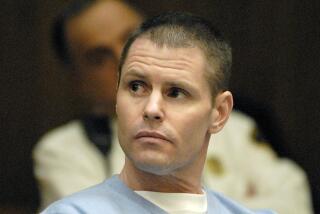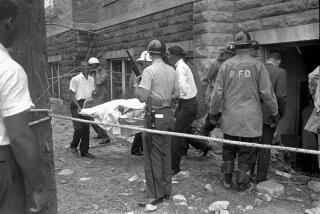Victims’ relatives confront Bulger
BOSTON — James “Whitey” Bulger has loomed large in Sean McGonagle’s life for decades.
In 1974, Bulger called his family’s house after McGonagle’s father, Paul, disappeared. When 11-year-old Sean picked up the phone, Bulger told him he’d never see his father again, and identified himself as Santa Claus.
Later, Bulger told young Sean that he’d use him for target practice. Finally, in 2000, authorities notified him that they had found Paul McGonagle’s remains on a Boston beach.
On Wednesday, Sean McGonagle, now 49, described his ordeal and confronted his longtime tormentor in court. He was the first of a dozen family members of Bulger’s victims and alleged victims who spoke during the first day of the Boston mobster’s sentencing hearing.
“Bulger, you thought you carried yourself as an Irish icon, but nothing could be further from the truth,” he said in front of a packed courtroom of families and reporters. “You’re a domestic terrorist fueled by greed and a sickening ego. ... My strongest desire is that you are punished to the fullest extent of the law.”
McGonagle’s testimony was followed by families who spoke of husbands torn in half by bullets, fathers who never came to pick up their daughters, parents who were so afraid of Bulger that they gave up their dreams.
Bulger, now 84, was convicted of 11 murders in addition to racketeering and weapons possession charges this summer after a two-month trial. Prosecutors have asked for two consecutive life terms plus five years. Judge Denise J. Casper will sentence him Thursday.
Bulger was captured in Santa Monica in 2011 after 16 years as a fugitive.
In the hour and a half that the families spoke, describing how Bulger’s crimes had affected their lives, he was called a punk, a coward, Satan, a rat and a domestic terrorist. When Casper asked Bulger whether he would speak, he uttered just one word: “No.”
His lawyers did not weigh in on his sentencing, saying in court that he had instructed them not to participate in the process. Defense attorney J.W. Carney Jr. elaborated outside the courthouse after the hearing.
“From his perspective, he did not receive a fair trial because he was not able to put forward everything that he could have told about the corruption and about the immunity agreement he had reached with the federal prosecutor,” Carney said. “The trial became a sham, in his mind, as a result.”
During the trial, Bulger insisted that he had been given immunity by a federal prosecutor during his days as a Boston crime boss, but that he was not an informant. He was not allowed to present a case based on that claim of immunity.
His lawyers said after Wednesday’s hearing that he had volunteered to plead guilty in exchange for leniency for his girlfriend, Catherine Greig, who is serving eight years in prison for helping him evade capture.
Many of the victims’ family members referred to Bulger’s relationship with the FBI, criticizing the government for allowing him to kill without consequence for years in Boston.
“Quite possibly our father could be alive today if it weren’t for the corrupt proclivities of federal, state and Boston city law enforcement,” said Kathleen Connors Nichols, who spoke on behalf of herself and six siblings. Her father, a tavern owner, was gunned down in 1975 because Bulger thought he knew too much.
But prosecutor David Kelly said in court Wednesday that the FBI’s actions were no excuse for Bulger’s reign of terror.
“Make no mistake, the stupidity and dishonesty of FBI agents like John Connolly and John Morris, they don’t excuse Bulger’s savagery. They don’t give him a basis for any leniency,” he said. “The defendant has been getting arrested since the time Harry Truman was president.”
Connolly, who is in prison, tipped off Bulger about his indictment, triggering his flight.
As the family members spoke, decades of anger and sadness spilled out.
“Shame on you, Mr. Bulger. For all your notoriety, you are a punk. You don’t even matter anymore,” said David Wheeler, whose father, businessman Roger Wheeler, was killed in 1981. “You have turned from government-sponsored assassin into a bag of jailhouse rags, waiting to be stored on cold steel.”
Wearing a bright-orange jumpsuit, Bulger sat quietly and doodled on a notepad, rarely looking at the victims who spoke to him.
“Could you please look at me,” said Theresa Bond, whose father, Arthur Barrett, was shot in the back of the head in 1983. Bulger looked up for a few seconds. “I just want you to know that I don’t hate you. I do hate the choices that you’ve made along with your associates. I hate the choices that our government has made to allow you to rule the streets and perform such horrific acts of evil.”
Perhaps the most emotional witness of the day was Steven Davis, who has been a constant presence during the trial, both in the media and in court. Davis believes that Bulger strangled his sister Debra in 1981, although the jury did not reach a verdict on her death. Casper allowed some family members to testify even though the jury did not convict Bulger of their relatives’ slayings.
Davis cursed at Bulger in court, then broke down in tears. “This man has built up so much hate in my heart that I’d like to strangle him myself,” he said.
“I hope Whitey dies the same way my sister did, gasping for breath as he takes his last breath,” Davis said. “His widespread ... reign of murder, extortion, is finally over.”
--
More to Read
Sign up for Essential California
The most important California stories and recommendations in your inbox every morning.
You may occasionally receive promotional content from the Los Angeles Times.











